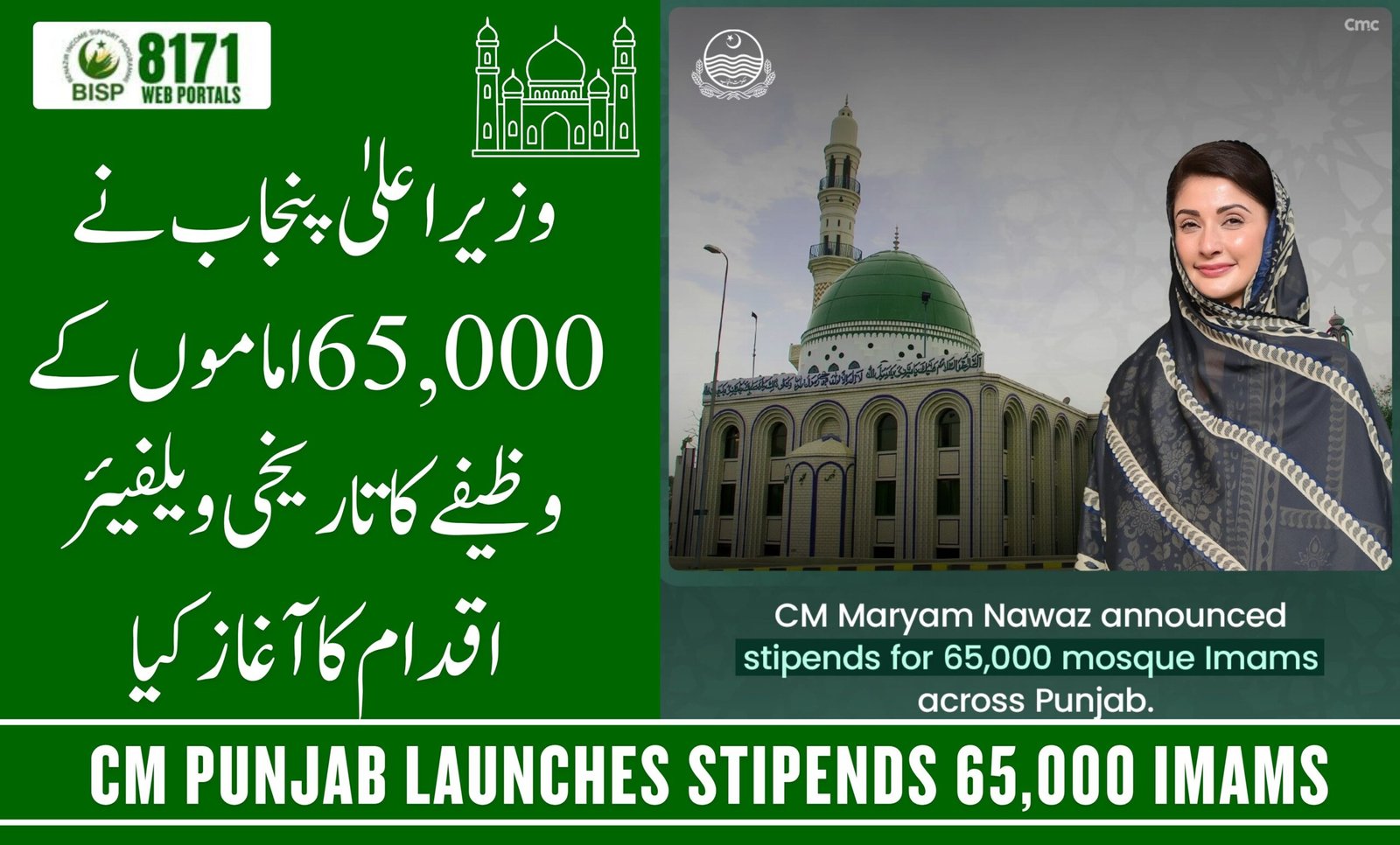When Maryam Nawaz, the Chief Minister of Punjab (Pakistan), announced that her government will provide monthly stipends to the imams of 65,000 mosques, it marked a watershed moment. The headline CM Punjab Launches Stipends 65,000 Imams is not just news; it signals a shift in how religious institutions and their leaders are supported.
جب مریم نواز، وزیر اعلیٰ پنجاب (پاکستان) نے اعلان کیا کہ ان کی حکومت 65,000 مساجد کے اماموں کو ماہانہ وظیفہ فراہم کرے گی، تو یہ ایک اہم لمحہ ہے۔ شہ سرخی وزیراعلیٰ پنجاب نے 65000 اماموں کا وظیفہ جاری کر دیا صرف خبر نہیں ہے۔ یہ اس تبدیلی کی طرف اشارہ کرتا ہے کہ کس طرح مذہبی اداروں اور ان کے رہنماؤں کی حمایت کی جاتی ہے۔
For many imams, who traditionally relied on local donations or community support, this initiative brings meaningful financial relief. For the community at large, it reflects recognition of the mosque’s role in social and spiritual life. In this post, we will unpack the details of the programme, explore the vision behind the move, examine how imams can apply, and assess the broader implications.
بہت سے اماموں کے لیے، جو روایتی طور پر مقامی عطیات یا کمیونٹی سپورٹ پر انحصار کرتے تھے، یہ اقدام معنی خیز مالی ریلیف لاتا ہے۔ بڑے پیمانے پر کمیونٹی کے لیے، یہ سماجی اور روحانی زندگی میں مسجد کے کردار کی پہچان کی عکاسی کرتا ہے۔ اس پوسٹ میں، ہم پروگرام کی تفصیلات کو کھولیں گے، اس اقدام کے پیچھے کے نقطہ نظر کو تلاش کریں گے، اس بات کا جائزہ لیں گے کہ امام کس طرح درخواست دے سکتے ہیں، اور وسیع تر مضمرات کا جائزہ لیں گے۔
Table of Contents
Details of the Imam Stipend Program
Who Will Receive the Monthly Stipend?
- The initiative covers imams affiliated with approximately 65,000 mosques across Punjab province.
- It is designed for mosque imams serving in both urban and rural contexts. The provincial government emphasised that “it is **not appropriate for communities to collect donations for the imam’s salary”.
- The announcement came during a government law-and-order meeting chaired by the CM, signaling integration with broader governance priorities.
- While the full eligibility criteria (such as minimum service years, mosque registration, etc.) have not yet been fully published, the verification will involve local deputy commissioners and assistant commissioners directly engaging with imams.
اس اقدام میں صوبہ پنجاب کی تقریباً 65,000 مساجد سے وابستہ امام شامل ہیں۔
اسے شہری اور دیہی دونوں حوالوں سے خدمت کرنے والے مساجد کے اماموں کے لیے ڈیزائن کیا گیا ہے۔ صوبائی حکومت نے اس بات پر زور دیا کہ “برادریوں کے لیے امام کی تنخواہ کے لیے چندہ جمع کرنا ** مناسب نہیں ہے”۔
یہ اعلان وزیر اعلیٰ کی زیر صدارت ایک حکومتی امن و امان کے اجلاس کے دوران ہوا، جس میں حکومت کی وسیع تر ترجیحات کے ساتھ انضمام کا اشارہ ملتا ہے۔
اگرچہ اہلیت کے مکمل معیارات (جیسے کم از کم خدمت کے سال، مسجد کی رجسٹریشن وغیرہ) ابھی تک مکمل طور پر شائع نہیں ہوئے ہیں، لیکن تصدیق میں مقامی ڈپٹی کمشنرز اور اسسٹنٹ کمشنرز براہ راست اماموں کے ساتھ شامل ہوں گے۔
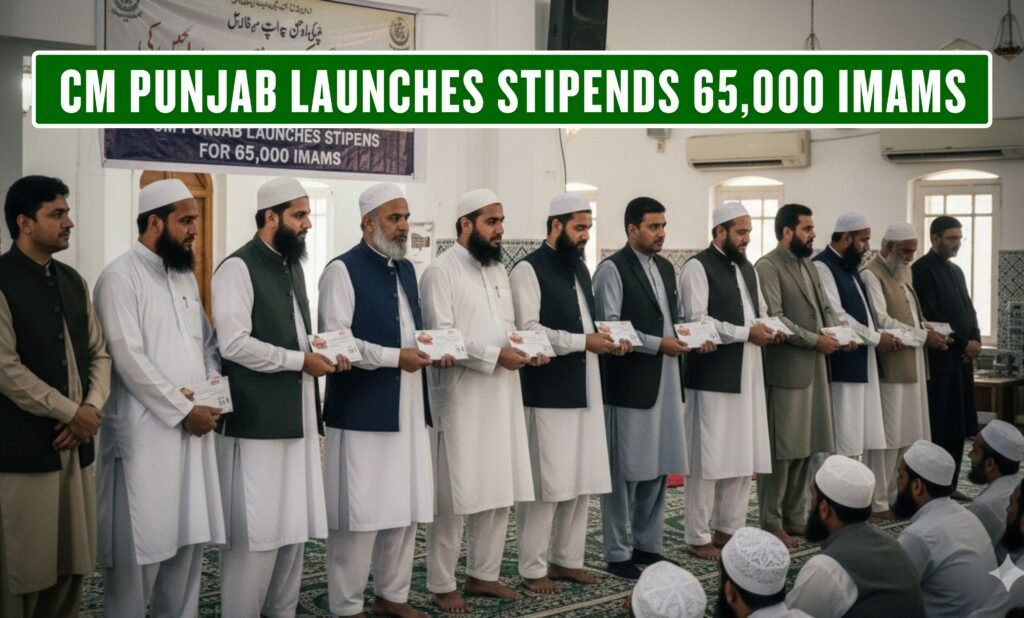
Related Topics
CM Punjab T Cash Card 2025 Apply Online apply Latest Updates
CM Punjab Loan Scheme 2025 Complete Guide to Apply Online
CM Punjab Bike Scheme 2025 Complete Guide online apply now
Monthly Amount and Payment Method
- The precise monthly stipend figure has not yet been publicly confirmed in widely circulated sources beyond the announcement of “financial assistance”. Some reports simply state that the government will provide “a monthly stipend” without specifying amount.
- Payments are expected to be handled through the relevant provincial department overseeing religious affairs (likely the Auqaf or equivalent), with district-level officials responsible for verification and distribution. The CM directed deputy and assistant commissioners to personally visit local imams to ensure timely distribution.
- Alongside the stipend, the CM ordered that mosque construction and repair be included in the Annual Development Programme (ADP), thus linking stipend payments with broader support for mosque infrastructure.
ماہانہ وظیفہ کے درست اعداد و شمار کی ابھی تک “مالی امداد” کے اعلان کے علاوہ وسیع پیمانے پر گردش کرنے والے ذرائع میں عوامی طور پر تصدیق نہیں کی گئی ہے۔ کچھ رپورٹیں صرف یہ بتاتی ہیں کہ حکومت رقم بتائے بغیر “ماہانہ وظیفہ” فراہم کرے گی۔
توقع کی جاتی ہے کہ ادائیگیاں مذہبی امور کی نگرانی کرنے والے متعلقہ صوبائی محکمے (ممکنہ طور پر اوقاف یا اس کے مساوی) کے ذریعے تصدیق اور تقسیم کے ذمہ دار ضلعی سطح کے حکام کے ذریعے کی جائیں گی۔ وزیراعلیٰ نے ڈپٹی اور اسسٹنٹ کمشنرز کو ہدایت کی کہ وہ ذاتی طور پر مقامی اماموں کا دورہ کریں تاکہ بروقت تقسیم کو یقینی بنایا جا سکے۔
وظیفہ کے ساتھ ساتھ، وزیراعلیٰ نے حکم دیا کہ مسجد کی تعمیر اور مرمت کو سالانہ ترقیاتی پروگرام (ADP) میں شامل کیا جائے، اس طرح وظیفہ کی ادائیگیوں کو مسجد کے بنیادی ڈھانچے کے لیے وسیع تر تعاون سے جوڑ دیا جائے۔
Key Objectives of the CM Punjab Imam Stipend Scheme
- Promoting religious harmony and social welfare: By providing state support to mosque imams, the government aims to elevate their dignity and reduce reliance on ad-hoc community funding, thereby professionalising the role.
- Supporting low-income religious leaders: Many imams operate with minimal pay or rely solely on congregation donations. This stipend will reduce their financial vulnerability, enabling them to focus more on religious and community duties.
- Strengthening the mosque’s community role: With complementary infrastructure investment (repair, construction, ADP inclusion), mosques can become better-equipped community hubs, with their imams stable financially and institutionally supported.
مذہبی ہم آہنگی اور سماجی بہبود کو فروغ دینا: مساجد کے اماموں کو ریاستی مدد فراہم کرکے، حکومت کا مقصد ان کے وقار کو بلند کرنا اور ایڈہاک کمیونٹی فنڈنگ پر انحصار کم کرنا ہے، اس طرح اس کردار کو پیشہ ورانہ بنانا ہے۔
کم آمدنی والے مذہبی رہنماؤں کی حمایت: بہت سے امام کم سے کم تنخواہ کے ساتھ کام کرتے ہیں یا مکمل طور پر اجتماعی عطیات پر انحصار کرتے ہیں۔ یہ وظیفہ ان کی مالی کمزوری کو کم کرے گا اور انہیں مذہبی اور اجتماعی فرائض پر زیادہ توجہ دینے کے قابل بنائے گا۔
مساجد کے کمیونٹی کے کردار کو تقویت دینا: بنیادی ڈھانچے کی تکمیلی سرمایہ کاری (مرمت، تعمیر، ADP شمولیت) کے ساتھ، مساجد بہتر سے لیس کمیونٹی مرکز بن سکتی ہیں، ان کے ائمہ کو مالی اور ادارہ جاتی طور پر تعاون حاصل ہے۔
CM Punjab’s Vision Behind the Initiative
Maryam Nawaz’s Commitment to Religious Welfare
- The CM emphasised that “mosque imams are highly respected members of society and should not have to rely on community donations for their livelihood.
- This move aligns with preceding welfare efforts under her leadership: earlier in 2025, the Punjab government under her direction instituted Zakat reform mechanisms (such as increasing the Guzara allowance) and a tax-free budget focused on social welfare.
- Public response has been broadly positive in media reports, with religious circles calling this a “first-of-its-kind initiative in Pakistan”.
- It factors into the 2025 welfare agenda of the Punjab government, by linking religious leadership support with law-and-order, community infrastructure and broader governance priorities. The stipend announcement came during a meeting focused on law-and-order reforms.
وزیراعلیٰ نے اس بات پر زور دیا کہ “مسجد کے امام معاشرے کے انتہائی قابل احترام رکن ہیں اور انہیں اپنی روزی روٹی کے لیے کمیونٹی کے عطیات پر انحصار نہیں کرنا چاہیے۔
یہ اقدام ان کی قیادت میں سابقہ فلاحی کوششوں کے ساتھ مطابقت رکھتا ہے: 2025 کے اوائل میں، پنجاب حکومت نے ان کی ہدایت پر زکوٰۃ کے اصلاحاتی طریقہ کار (جیسے کہ گوزارہ الاؤنس میں اضافہ) اور ٹیکس فری بجٹ سماجی بہبود پر مرکوز کیا۔
میڈیا رپورٹس میں عوامی ردعمل بڑے پیمانے پر مثبت رہا ہے، مذہبی حلقوں نے اسے “پاکستان میں اپنی نوعیت کا پہلا اقدام” قرار دیا ہے۔
یہ پنجاب حکومت کے 2025 کے فلاحی ایجنڈے میں شامل ہے، مذہبی قیادت کی حمایت کو امن و امان، کمیونٹی انفراسٹرکچر اور وسیع تر گورننس کی ترجیحات سے جوڑ کر۔ وظیفہ کا اعلان امن و امان کی اصلاحات پر مرکوز ایک میٹنگ کے دوران ہوا۔
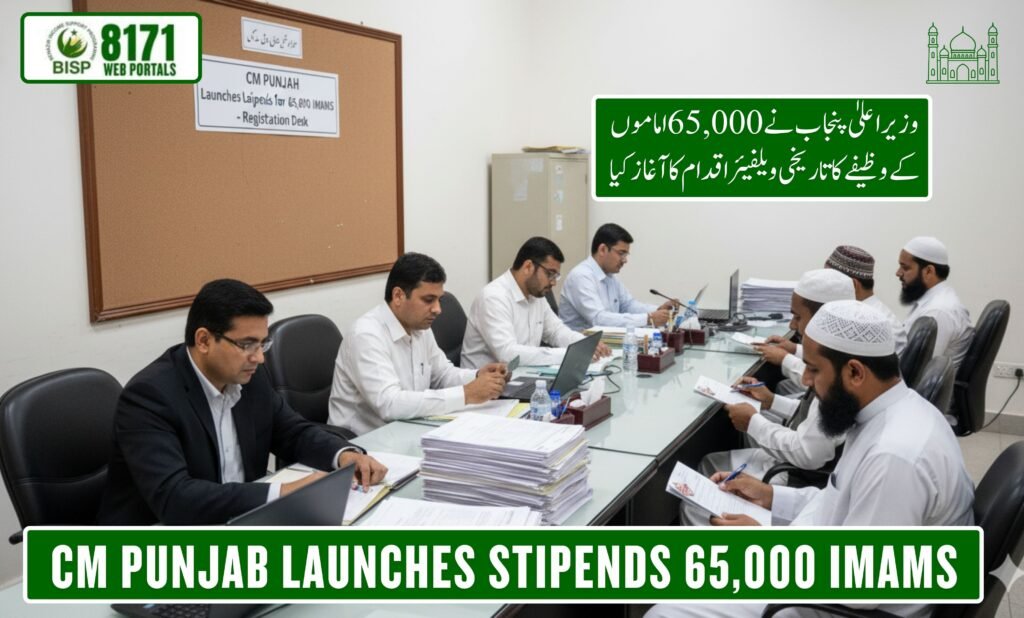
How to Apply for the Imam Stipend Program
Step-by-Step Registration Process
- Applicants (imams) should monitor official communication from the provincial Auqaf department or the relevant district Deputy Commissioner’s office for registration guidelines. The CM’s direction to local officials suggests district offices will play a role.
- Likely required documents will include: valid mosque registration/domicile proof, imam’s identity, work/service certificate in the mosque, bank account details for payment, and possibly verification from the local Assistant Commissioner.
- Important deadlines and district-wise rollout details have not yet been fully specified publicly; imams should stay alert to official notifications from the Punjab government.
How to Check Imam Stipend Status Online
- Once the portal is launched, applicants will likely be able to enter their registration number or national ID to check status; typical formats in Punjab welfare schemes use the national ID and bank account link.
- In the meantime, concerned imams can contact the Deputy Commissioner’s office or Auqaf department in their district to ascertain when payment cycles will begin and how verification will proceed.
- Common issues: delays due to missing documentation, non-registration of mosque, or bank account mismatches. Imams are encouraged to proactively resolve any discrepancies to avoid payment delays.
پورٹل کے شروع ہونے کے بعد، درخواست دہندگان ممکنہ طور پر اسٹیٹس چیک کرنے کے لیے اپنا رجسٹریشن نمبر یا قومی شناخت درج کر سکیں گے۔ پنجاب کی فلاحی اسکیموں کے عام فارمیٹس میں قومی شناختی کارڈ اور بینک اکاؤنٹ کا لنک استعمال ہوتا ہے۔
اس دوران، متعلقہ ائمہ اپنے ضلع میں ڈپٹی کمشنر کے دفتر یا محکمہ اوقاف سے رابطہ کر سکتے ہیں تاکہ یہ معلوم کر سکیں کہ ادائیگی کا سلسلہ کب شروع ہو گا اور تصدیق کیسے ہو گی۔
عام مسائل: دستاویزات غائب ہونے، مسجد کی رجسٹریشن نہ ہونے، یا بینک اکاؤنٹ کی عدم مطابقت کی وجہ سے تاخیر۔ اماموں کی حوصلہ افزائی کی جاتی ہے کہ وہ ادائیگی میں تاخیر سے بچنے کے لیے کسی بھی تضاد کو فعال طور پر حل کریں۔
Public and Religious Community Reaction
- Many religious scholars and mosque committees have welcomed the announcement, calling it “historic” and emphasising that imams deserve dignity and reliable compensation.
- On social media and in local reports, the discussion centres on how this stipend may reduce symptoms of exploitation (when imams are compelled to collect funds from worshippers) and strengthen independence and morale.
- Some commentators caution that the real test will be in implementation: timely payments, transparency in selection, and inclusive coverage of all eligible imams, including those in remote/rural mosques.
- News coverage emphasises the symbolic and practical importance of the move — positioning the mosque as a well-maintained community pillar, and the imam not an under-paid volunteer but a state-supported religious worker.
بہت سے مذہبی اسکالرز اور مساجد کمیٹیوں نے اس اعلان کا خیرمقدم کیا ہے، اسے “تاریخی” قرار دیا ہے اور اس بات پر زور دیا ہے کہ امام عزت اور قابل اعتماد معاوضے کے مستحق ہیں۔
سوشل میڈیا پر اور مقامی رپورٹس میں اس بات پر بحث ہوتی ہے کہ یہ وظیفہ کس طرح استحصال کی علامات کو کم کر سکتا ہے (جب اماموں کو نمازیوں سے چندہ جمع کرنے پر مجبور کیا جاتا ہے) اور آزادی اور حوصلے کو تقویت ملتی ہے۔
کچھ مبصرین خبردار کرتے ہیں کہ اصل امتحان نفاذ میں ہوگا: بروقت ادائیگی، انتخاب میں شفافیت، اور تمام اہل اماموں کی جامع کوریج، بشمول دور دراز/دیہی مساجد میں۔
خبروں کی کوریج اس اقدام کی علامتی اور عملی اہمیت پر زور دیتی ہے – مسجد کو ایک اچھی طرح سے برقرار رکھنے والے کمیونٹی کے ستون کے طور پر، اور امام ایک کم تنخواہ والے رضاکار نہیں بلکہ ریاست کی طرف سے حمایت یافتہ مذہبی کارکن ہیں۔
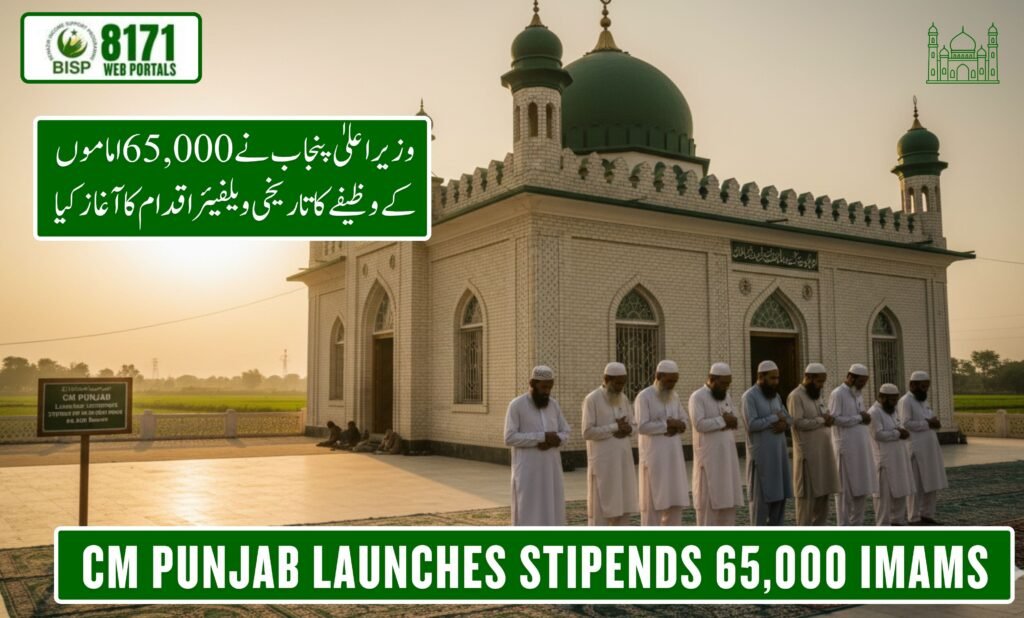
Impact of the Stipend on Punjab’s Religious Sector
Economic Relief for Imams
- Financial stability for imams means they can devote more time to pastoral, educational and community roles rather than fund-raising or multiple jobs.
- Smaller or rural mosques often operate on very limited budgets; state-funded stipends could minimise discrepancies between urban and rural institutions, helping uplift community services.
- Picture a small village mosque where the imam becomes a reliable educator, community liaison and mentor, not constantly worried about income.
ائمہ کے لیے مالی استحکام کا مطلب ہے کہ وہ فنڈ اکٹھا کرنے یا ایک سے زیادہ ملازمتوں کے بجائے پادری، تعلیمی اور کمیونٹی کے کرداروں میں زیادہ وقت لگا سکتے ہیں۔
چھوٹی یا دیہی مساجد اکثر بہت محدود بجٹ پر کام کرتی ہیں۔ ریاستی فنڈ سے ملنے والے وظیفے شہری اور دیہی اداروں کے درمیان فرق کو کم کر سکتے ہیں، جس سے کمیونٹی سروسز کو بہتر بنانے میں مدد مل سکتی ہے۔
گاؤں کی ایک چھوٹی مسجد کی تصویر بنائیں جہاں امام ایک قابل اعتماد معلم، کمیونٹی رابطہ اور سرپرست بن جاتا ہے، آمدنی کے بارے میں مسلسل فکر مند نہیں ہوتا۔
Promoting Religious Harmony
- By institutionalising support for imams, the government sends a message that religious leadership is valued as part of broader governance and community welfare, not just as a separate sphere.
- This may strengthen cooperation between mosque-led community efforts (e.g., youth mentoring, civic awareness, peace-building) and provincial government objectives (law-and-order, social cohesion).
- When imams feel recognised and supported, they can play stronger roles in countering extremism, promoting tolerance, and building bridge-work across different segments of society.
At-a-Glance Comparison Table
| Feature | Before the Initiative | After the Initiative |
|---|---|---|
| Financial status of imams | Often depended on community donations | Monthly stipend from provincial government |
| Infrastructure support for mosques | Variable; many mosques under-resourced | Mosque construction/repair included in ADP alongside stipend |
| Role of mosque in community | Primarily religious; limited formal state link | Recognised part of welfare & governance ecosystem |
| Government-religious sector tie | Less formalised support | Formal state-led support for religious leadership |
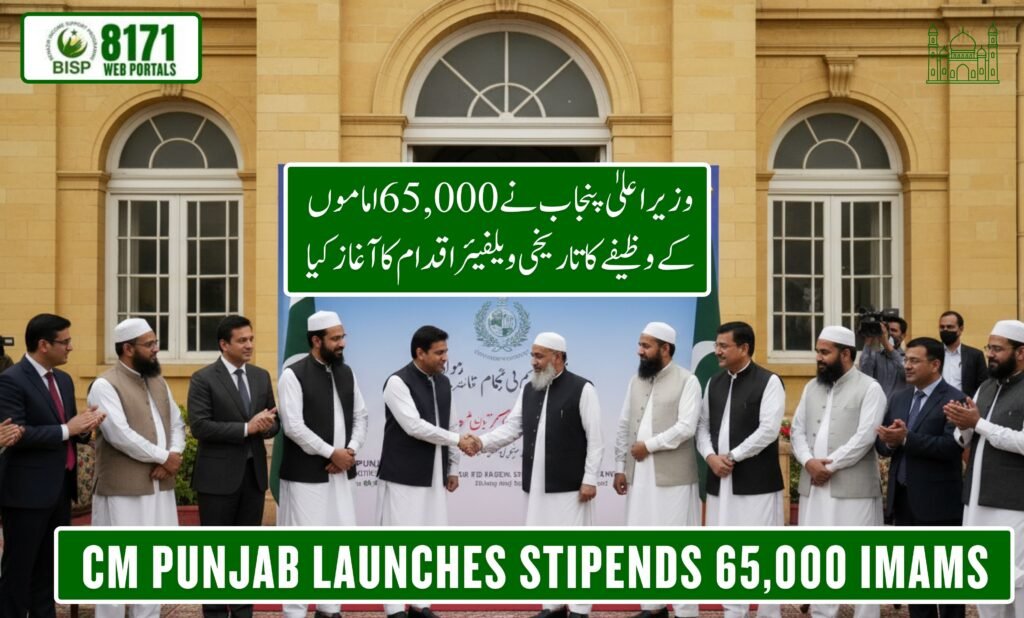
Conclusion
The announcement of “CM Punjab Launches Stipends 65,000 Imams” marks a significant step forward in the welfare ecosystem of Punjab province. By formally recognising the financial needs of mosque imams and pairing this with infrastructure support for mosques, the government has laid the groundwork for a more robust religious-community interface.
“وزیراعلیٰ پنجاب نے 65,000 اماموں کے وظیفے کا آغاز کیا” کا اعلان صوبہ پنجاب کے فلاحی ماحولیاتی نظام میں ایک اہم پیش رفت ہے۔ مساجد کے اماموں کی مالی ضروریات کو باضابطہ طور پر تسلیم کرتے ہوئے اور مساجد کے لیے بنیادی ڈھانچے کی مدد کے ساتھ اس کو جوڑ کر، حکومت نے مزید مضبوط مذہبی-برادری انٹرفیس کی بنیاد رکھی ہے۔
Looking ahead, consistent execution, transparency and inclusive coverage will determine whether this policy becomes a model for religious welfare. For now, the move underscores the growing understanding that the spiritual leadership embodied by imams is integral to community well-being and state governance alike.
آگے دیکھتے ہوئے، مسلسل عملدرآمد، شفافیت اور جامع کوریج اس بات کا تعین کرے گی کہ آیا یہ پالیسی مذہبی بہبود کے لیے ایک نمونہ بنتی ہے۔ ابھی کے لیے، یہ اقدام اس بڑھتی ہوئی سمجھ کی نشاندہی کرتا ہے کہ ائمہ کی طرف سے مجسم روحانی قیادت کمیونٹی کی فلاح و بہبود اور ریاستی حکمرانی کے لیے یکساں ہے۔
FAQs
Q1. What is the CM Punjab imam stipend amount?
As of now, the exact monthly stipend amount for imams under the programme has not been publicly specified beyond the broad announcement of monthly financial support.
Q2. How can imams apply for the stipend program?
Imams should await official notification from the provincial Auqaf or Deputy Commissioner’s office regarding registration. The process will likely require mosque registration, identity proof, bank account details, and verification by district officials.
Q3. Who is eligible for Punjab imam financial aid?
Eligibility covers imams serving in the 65,000 mosques across Punjab. Additional criteria (such as minimum service period or mosque registration status) may be defined by the provincial department once detailed guidelines are released.
Q4. When will stipends be distributed?
The programme was announced on 27 October 2025, and implementation timelines will be determined by district offices. The CM directed deputy commissioners to visit local imams and expedite payments.
Q5. Which department is handling stipend verification?
The provincial government, in coordination with the Deputy Commissioners and Assistant Commissioners at the district level, will handle verification. The mosque infrastructure support will be integrated through the Annual Development Programme (ADP).
